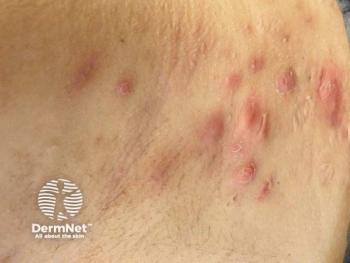
In Interim Analysis, Mogamulizumab Demonstrates Improvements In Mycosis Fungoides, Sézary Syndrome
Interim findings from the PROSPER study of mogamulizumab in adults with CTCL were recently presented orally.
Findings from the first interim analysis of
PROSPER is a prospective, observational, non-interventional, international, multi-center, and mixed methods study. Researchers are integrating qualitative and quantitative data regarding the use of mogamulizumab-kbkc (Poteligeo; Kyowa Kirin) as therapy for patients with mycosis fungoides (MF) and Sézary syndrome (SS)--both of which are subtypes of cutaneous T-cell lymphoma (CTCL).2
The findings were presented by Julia Scarisbrick, a consultant dermatologist, lead of the Cutaneous Lymphoma Service at the Rare Diseases Centre at University Hospital Birmingham. Scarisbrick is also an honorary professor at the Institute of Immunology and Immunotherapy at the University of Birmingham and the study's lead investigator.
In the interim analysis, 20 adult patients with relapsed or refractory disease, including 8 with MF and 12 with SS, underwent 16 weeks of treatment with mogamulizumab. At baseline, patients were instructed to rate their symptom severity on a scale of 1 to 10.
Of the symptoms reported by participants, the most common were skin itch, redness, flaking, and pain. Additionally, many patients also reported experiencing sleep disturbances and difficulty regulating body temperature.
To date, researchers have found that within 4 weeks of treatment, all symptoms demonstrated improvement, with significant reductions observed by week 16. The most significant improvement was noted in patients' overall skin redness, followed closely by itch, flaking, and pain. Furthermore, the proportion of patients experiencing sleep problems or temperature regulation difficulties decreased substantially by the end of the treatment period.
PROSPER is prospectively following the journey of 80 adult patients diagnosed with MF/SS. The study, initiated on November 9, 2022, is set to conclude by September 5, 2024. Its scope extends across up to 8 countries, encompassing North America and various European nations. Patients will be followed for a period of up to 50 weeks from initial study enrollment.
The primary objective of the PROSPER study is to offer insights into real-world clinical practices and factors influencing treatment decisions. Additionally, the study seeks to amass patient-reported outcomes data, complemented by qualitative narratives on disease and treatment experiences.
Throughout the study period of up to 50 weeks from enrollment, researchers will assess patient-reported changes in key signs and symptoms of the disease, fatigue levels, and health-related quality of life following the initiation of treatment. Caregiver perspectives will also be incorporated, gauging changes in their quality of life as the patients undergo treatment.
"We know that CTCL patients not only suffer from the stress of a cancer diagnosis, but that these stresses are compounded by visual lesions and varying levels of discomfort," Scarisbrick said in a news release.1 "The PROSPER study is helping us understand these burdens better and the impact mogamulizumab may have on patients' symptoms and quality of life."
References
- First interim analysis of PROSPER study details patient-reported symptom burden of mycosis fungoides and Sézary syndrome. News release. PR Newswire. April 15, 2024. Accessed April 16, 2024.
https://www.prnewswire.com/news-releases/first-interim-analysis-of-prosper-study-details-patient-reported-symptom-burden-of-mycosis-fungoides-and-sezary-syndrome-302116170.html - A randomized, double-blind, placebo-controlled, multicenter, phase 3 study to evaluate the efficacy and safety of Poteligeo in adult patients with MF and SS. ClinicalTrials.gov identifier: NCT05455931. Date updated: February 13, 2023. Accessed April 16, 2024.
https://classic.clinicaltrials.gov/ct2/show/NCT05455931?term=NCT05455931&draw=2&rank=1
Newsletter
Like what you’re reading? Subscribe to Dermatology Times for weekly updates on therapies, innovations, and real-world practice tips.










